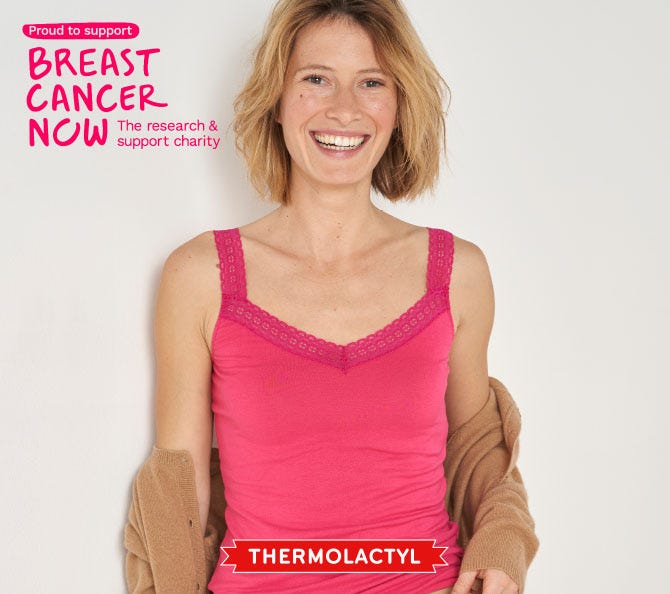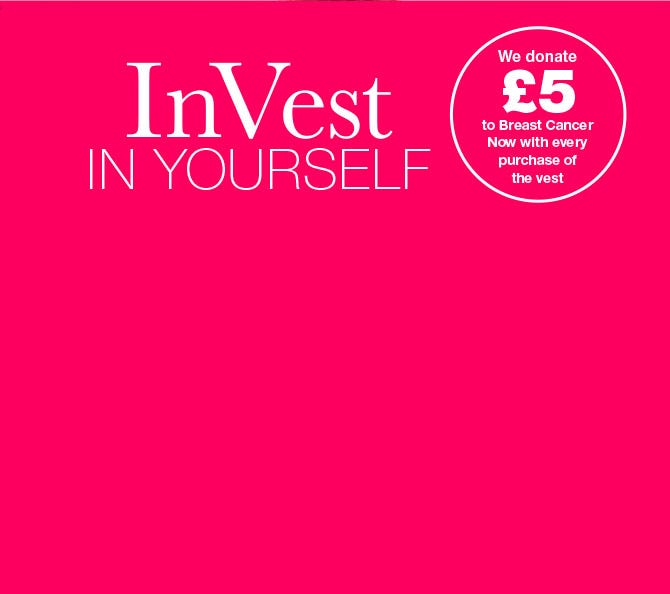
Get to know your breasts with some TLC - Touch, Look, Check. It could make all the difference.
Make checking your breasts part of your self care routine, set a reminder on your phone or make a note on your calendar. Check them - it could make all the difference. Touch, Look, Check
This October is Breast Cancer Awareness Month and will donate £5 with every purchase of the vest to Breast Cancer Now.
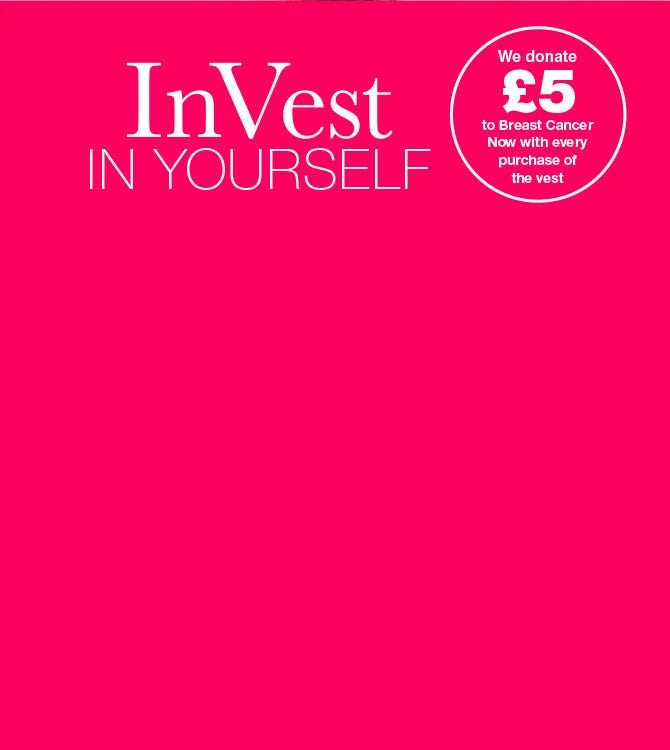
Get to know your breasts with some TLC - Touch, Look, Check. It could make all the difference.
Make checking your breasts part of your self care routine, set a reminder on your phone or make a note on your calendar. Check them - it could make all the difference. Touch, Look, Check
This October is Breast Cancer Awareness Month and will donate £5 with every purchase of the vest to Breast Cancer Now.
Breast Cancer Awareness Month
Anybody can be affected by breast cancer. So, whoever you are it's important to regularly check your breasts. Learn what's normal for you and contact a GP if you notice anything new or unusual. Check them - it could make all the difference. Touch, Look, Check
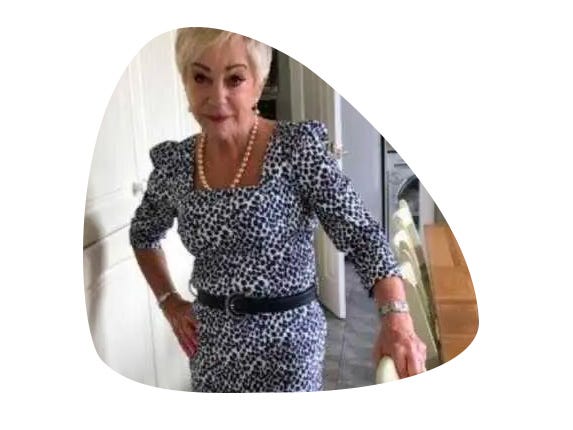
“Having cancer four times over 17 years has given me a greater awareness of life”
Angela was first diagnosed with breast cancer in 1989. Since then, she has done what she can to help others with a diagnosis.
Attitudes were so different when I was first diagnosed
I was diagnosed for the first time in 1989 at the age of 45, and I had my first lumpectomy around the same time as the Berlin Wall came down. This was shortly followed by a course of radiotherapy, after which I felt like I could cook an egg on my left breast! Other than that and some tiredness, I didn’t really experience any side effects.
Attitudes towards breast cancer were very different at the time – there seemed to be a general consensus that even talking about it could make it contagious. Even medical staff would talk to me with their heads tilted to the side, asking ‘How are you?’ in a whisper.
Aside from with my immediate family, it wasn’t really an area for deep discussion. However, I do recall that my sister absolutely refused to discuss it and wouldn’t even have a mammogram for her own sake.
Years later, her daughter was diagnosed with breast cancer and sadly passed away. When my niece received her diagnosis, my sister called and asked, ‘Do we know anyone in the family who has had breast cancer?’ She was totally oblivious to my experiences!
I dealt with everything pragmatically
10 years later, in 1999, I had my first recurrence. I then had another in 2003 and a third in 2006. In total, I’ve had three lumpectomies and a double mastectomy with immediate reconstruction.
The first time, my cancer was discovered by mammogram. It was detected by ultrasound each subsequent time. I was very lucky to have had excellent care with specialists with each of my diagnoses.
I recall being rather pragmatic about everything. It was a shock but, when you’re a patient, it can feel as if you are on a conveyor belt going through procedures. You just have to get on with it. Often, it is harder for other people, as to them everything appears to be out of control.
The fourth diagnosis was probably the hardest as it came back so soon after the third. The oncologist called me directly, so I knew it was going to be bad news.
On the whole, I was mostly worried that people would treat me differently because of cancer. But I was and still am the same person I always was.
I loved volunteering and helping others
After my first diagnosis, I volunteered at Breast Cancer Care (which later became Breast Cancer Now). I even had the pleasure of meeting Betty Westgate, who founded it in the first place – a delightful and fascinating lady. I used to go in once or twice a week, make or take calls, and continued to do so for a few years until personal circumstances got in the way.
When I became a counsellor all those years ago, I realised just how lucky I was to always have people around when I wanted or needed them, as so many people do not.
I felt this most keenly when having my radiotherapy in 1989, when friends filled up my ‘dance card’ within nanoseconds, so there was always someone there to take and bring me home – usually just after a lunch.
At the same time, there was another lady having treatment who was always alone. When I asked her how she was, she said, ‘Getting through it’. I asked if she had any friends or family who could share the experience with her and she explained that, although her family were very sympathetic when she was diagnosed, they felt it was over once she’d had surgery – hence no need for any discussion or support when needed.
I feel very lucky and I want to give back
Because of experiences like this, I have previously volunteered and raised money for different charities. I enjoyed meeting people, finding out their stories, listening to their fears and their attitudes to life when diagnosed, during or after treatment.
When I married my husband Peter in 2014, a lot of our friends wanted to buy us gifts even though we requested no presents (I did not need another toaster!). We did, however, say that people could donate money if they wanted, and we ended up raising £13,600 in total – half of which went to Breast Cancer Now.
Overall, I would say having breast cancer has given me a greater awareness of life and a determination not to waste it, and really to forget the small stuff and focus on the bigger picture. I learnt to pace myself and listen to my body.
I feel I have a lot still to offer and, being 77 and approaching semi- or full retirement, I would like to give back some of the special gifts I have been lucky enough to receive.
“I was lucky to have a doctor who took my symptoms seriously, otherwise I might have ignored the lump"
Before he was diagnosed in 2012, Doug had no idea men could get breast cancer. Now, he wants to raise awareness amongst other people and improve resources for men affected by breast cancer.
At the end of 2011, I noticed what I thought was a cyst on my left breast. I kept moaning about it, and eventually my wife told me to go and see the GP. So, I booked myself an appointment for two days before Christmas.
It started off fine - I was laughing and joking with the doctor but, as soon as I took my top off, he became quite serious. The next thing I know, he’s tapping away on his computer and telling me I need to go to hospital to get it checked out.
When I asked if it could be cancer, he told me that he couldn’t rule it out.
At that point, I didn’t know that men could get breast cancer. I’ve got a couple of mates who are nurses, so I asked them about it. They told me it was possible, but assured me that it was very rare.
However, three days before my 50th birthday, I found out it was breast cancer. I really didn’t think they were going to say that – and not because I’m optimistic (I’m really not!), but because I’d looked it up on Google and seen how few men actually get it.
I had to deal with so many other things during treatment
When I went in to have my mastectomy, they discovered during the pre-op that I had type-2 diabetes, so the operation had to be pushed back a few weeks in order for me to get my blood sugar levels down.
Shortly after I did get around to having it, my mum passed away quite unexpectedly. I had to go to the funeral so soon after my surgery that I still had the drain in my armpit. I felt like some sort of vampire carrying around a bag of blood. I spent the whole time trying to hide it away – it must’ve looked awful.
I later needed another drain because I had more surgery to remove my lymph nodes, and that one fell out. The hospital couldn’t put it back in and, without it, I started to develop this lump under my arm. It looked like it was full of liquid.
A few weeks later, when I went in for chemotherapy, a nurse asked me how I was feeling. Ironically, they need to check you’re healthy enough before they can give you treatment which makes you sick. I told her I hadn’t been eating normally, which was strange for me. When she felt my chest, something obviously concerned her because she went and got someone else to talk to me.
It turned out that the lump had burst and become infected. I spent a week on a hospital ward, as the infection had got into my system and become life-threatening.
I wanted to raise awareness for other men
One of the first things I did when I got my diagnosis was start a blog in order to raise awareness. My wife encouraged me to do it after I posted on Facebook with the news, as a lot of people had commented saying they didn’t know men could get breast cancer.
I’ve tried to keep up raising awareness ever since, especially as so many men don’t know the risk.
The death rate in men with breast cancer is quite high because they don’t get diagnosed soon enough. I’ve heard of men being told to wait for months to see if anything changes. I was lucky enough to have a doctor who took my symptoms seriously because, if I was told that, I probably would never have gone back unless it got really bad.
The first thing I did with Breast Cancer Now was taking part in The Show in 2012. I was going through chemotherapy at the time, so I was bald as a coot, but I was ok with it. My hair was one of the few things I actually felt in control of during my treatment, and I’d made the decision to shave it all before it fell out.
That was also the first time I met another man with breast cancer, which was really emotional. We didn’t even talk about the cancer that much – it was just good to meet someone who knew what I was going through.
Male breast cancer is finally getting proper recognition
Of course, I had spoken to other women who had breast cancer. There was a group of women I’d call my sisters, and I got a lot of comfort and advice from them, but it’s not quite the same.
Now, we have the Virtual Meet Up group for men. I wish that had been around when I was first diagnosed, but breast cancer in men wasn’t really recognised properly 10 years ago.
Since then, though, Breast Cancer Now have been brilliant. They’ve really listened to us and given us the time and space to talk about male breast cancer. Even just the information on their website is so helpful – much more helpful than just turning to Google!
The majority of people diagnosed with breast cancer are women, so when you’re a man with breast cancer, it can be hard to find people who understand. At Breast Cancer Now, we’re here for anyone affected with breast cancer, and are always looking for ways we can support you better.
One of our most popular services is our online discussion Forum, which is open to anyone affected by breast cancer, every step of the way. It’s a space where you can talk to thousands of people with real experience of breast cancer.
You told us that we needed to do more for men affected by breast cancer. So, we’ve created a space just for men on our Forum. It’s a confidential area where you can share tips and information, and talk about what’s on your mind, with other men who really get it.
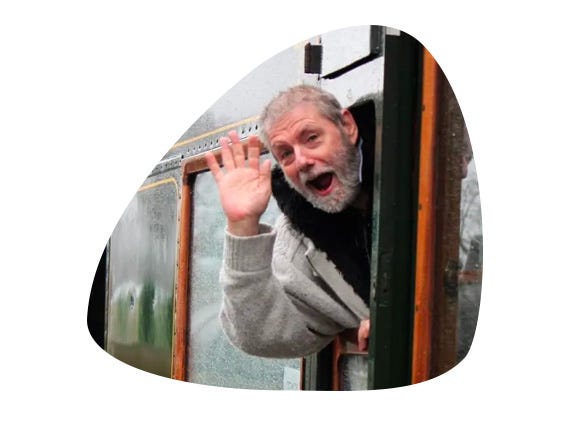
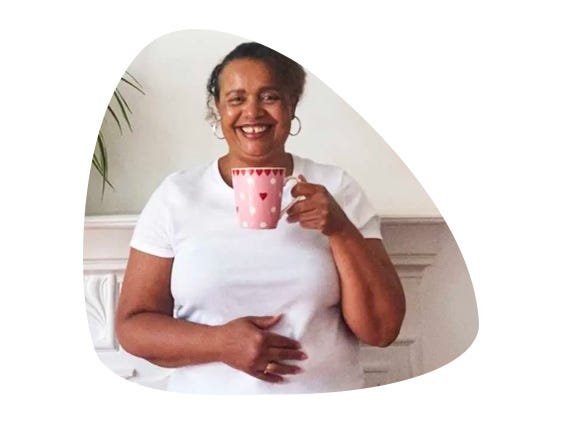
“When I first noticed a change in my breast, I thought nothing of it”
Lorraine’s initial breast cancer symptoms were not what she expected, so she didn’t see her doctor. When she was eventually diagnosed, she worried it was too late for treatment.
I was diagnosed with breast cancer in April 2010, a month before I turned 48. Just prior to my diagnosis, I had found a large lump on my left breast that felt like a small golf ball. On closer inspection, I also noticed that my nipple had slightly pulled to the side.
But these were not my first symptoms. Several months earlier whilst checking my breast, at the edge of the areola where it met my skin, I felt something small and thin. It was like a wooden splinter or a sliced grain of uncooked rice.
At the time, I was not overly worried that it might be cancer because it wasn’t the typical ‘pea-sized lump’. I wondered whether it had always been there, and I had perhaps never noticed it.
It was my intention to check again the following month, but I was so unconcerned about it that I forgot. By the time I did remember, it had become much larger. At this point, I had no doubt that I had cancer and was angry with myself for not going to the GP earlier.
I was sceptical that I would survive
As I had already convinced myself that I had cancer prior to my formal diagnosis, I had started both practically and mentally preparing for death. However, I was thrown into a state of utter confusion when the doctor told me that my cancer was not only treatable but curable.
I had been thrown a lifeline, but it meant enduring 18 months of hospital treatments.
I must admit, although I was suddenly filled with hope, I did hold on to an element of scepticism and continued with my practical preparations, such as updating my will and making tentative arrangements for who my sons would live with if I were to die.
I tried to get through treatment on my own
I continued working until it was time for me to have my mastectomy and DIEP reconstruction. I had no intentions of working while I was going through chemotherapy.
At the time of my diagnosis, my sister and her family were living with me while their house was being renovated, so I had loads of support around me. However, I was determined to go through most of my treatment on my own as I didn’t want to feel dependent on others.
I was in for the long haul, and I didn’t think it was fair for my sister or my friends to have to take time out of work to come to my numerous hospital appointments, so I would only call on support if absolutely necessary.
It was initially strange going for chemotherapy on my own as nearly everyone had someone with them. I received some pitiful looks from the other patients and their supporters who I guess assumed that I had no friends or family.
I remained positive despite treatment difficulties
The effects of the treatment were gruelling. I lost all my hair. I was thrown into an early menopause, I lost my toenails and developed lymphoedema. I was hospitalised with infections, developed a blood clot and cardiomyopathy. The worst of all was losing my taste buds, as I love food!
Despite all this, I managed to go through treatment with a positive state of mind. I made the most of my new bald look by learning how to apply make-up and wearing colourful clothes. I had morphed from an invisible jeans and T-shirt woman to one of glamour and curiosity.
I came down to earth with a huge bump at the end of treatment and, instead of being elated, I sunk into a depression. I had brain fog, I couldn’t concentrate, I was fatigued, and I was scared about my future.
But even with the trials and tribulations of my cancer treatment, I have no regrets. I am so thankful and happy to be alive.
I want to encourage others to check their breasts
Before being diagnosed and going through treatment, I believed that breast cancer had only one outcome and that was death. I had no concept that I or anyone else would live for more than a few years post-diagnosis and I thought the sole purpose in having treatment was to extend life, not save it.
I am so glad I was wrong.
I want all women to know that if their breast cancer is diagnosed early enough, it can improve their chances of surviving. But it is even more important for me to encourage black women like myself who are of African heritage to be aware of how their breasts normally look and feel and report any changes to their GP, no matter how slight.
Far too many of us are being diagnosed late, which is reducing our chances of survival.
I have watched several friends die because they have either not checked their breasts or been too scared to go to the doctors when they have found a change.
I was too young for breast screening at the time of my diagnosis, and I am only here today telling my story because I checked my breasts and went to the GP. My story could have had a very different ending if I had not.
I survived because I checked my breasts, and I want other women to do the same.
The personal stories and experiences that you share with us can help us raise awareness of breast cancer, our life-saving research and the issues affecting patients. In some cases, we can use them in media activity, on digital and social media channels, in campaigning or fundraising materials and in internal communications to our staff.
To find out more about the signs and symptoms of breast cancer, head to the Breast Cancer Now website.
For each item sold, £5 of the purchase price will go to Breast Cancer Now. Breast Cancer Now is a charity registered in England and Wales (1160558), Scotland (SC045584) and the Isle of Man (1200).

